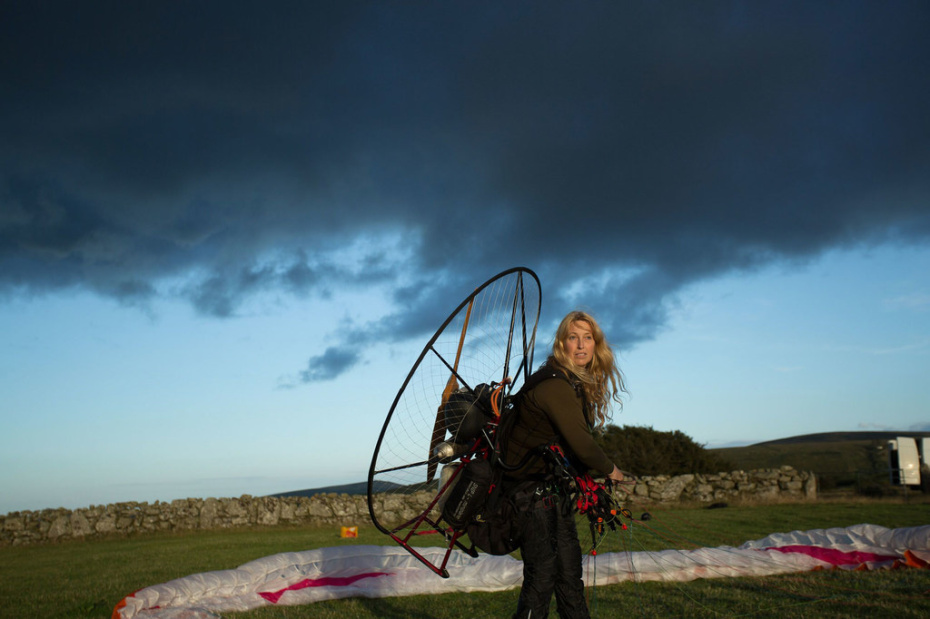Breadcrumb

First Person: The ‘Human Swan’ inspiring climate action

Flying as the lead bird
“Flying with birds is the most incredible thing ever. I'm really surprised that everybody doesn't do it! You see the world from a completely different perspective but also, you can have the most wonderful encounters with birds.
When I was flying across Russia there was this big flocks of birds across to my right and at one point two of the birds broke away from the main flock and flew with me like I was the lead bird, and it was absolutely magical.
We realized from the last expedition that everything impacting Bewick swan populations was pretty much exacerbated by climate change, and that was an issue we really wanted to focus on.
In addition, I had another close encounter with climate change last year, when we lost our family home in the Australian bushfires. I felt as if I couldn't ignore it anymore.
Changing the narrative
We want to change the whole narrative around climate change, particularly for those people who look at it and think it's this horrible scary thing. We want to try to reframe it as a massive opportunity, and show all the incredible ideas and innovators out there who are really trying to do something about it.
And we need a drastic shift in the way our economy works. We have destroyed so much natural habitat in the world that the planet is really struggling to cope. The Circular Economy is the only way to go.
Round Britain Challenge
- In 2016, Sacha Dench flew 7,000 kilometres, from Arctic Russia to the UK in a paramotor, to help save the Bewick swan. The flight, which saw her braving thunderstorms and polar bears, was an attempt to understand why Bewick swan populations were declining.
- In June 2021, Ms. Dench will set off on a new adventure flying around the entire coast of Britain, powered only by a paramotor, in an attempt to break two world records. During the trip she will be stopping off at farms, rewilding areas, small businesses and schools in order to discover their sustainability stories and share with the world as many innovative climate solutions as possible.
- As Ambassador for the UN Convention on Migratory Species, Sacha has campaigned to raise awareness of the problems facing many species and habitats around the world. However, during the ‘Round Britain Climate Challenge’ she will focus on climate change, which she describes as the greatest threat we are facing as a society.
- Ms. Dench hopes her expedition will raise awareness of the UN Climate Conference (COP26) in November, which is hosted by the UK, and actively engage the public in exciting climate solutions.

Time to step up
What really keeps me inspired is the fact that, if you can communicate something in the right way, you can get other people on board and wanting to help as well.
I don't want people to see the flying expedition and think, well, that’s the stuff of superheroes, but not something I can do: we need more people, not just those in the NGO conservation world, to step up and decide that, actually, this is really important to them as individuals.
For years now, I’ve been focusing on the stories of people that I've met along the way, and the things that they've offered to do to help because as soon as people hear stories like that, that's when they start to think, well, maybe I could do something too.
We need to keep showing people examples and stories of the massive impact that individuals, companies and other organisations can have if they get involved.

International Day for Biological Diversity
- International Day for Biological Diversity, celebrated on 22 May, celebrates the Convention on Biological Diversity, a UN treaty often seen as a key document regarding sustainable development, which entered into force on 29 December 1993.
- The loss of biodiversity threatens all life. It has been proven that biodiversity loss could expand zoonoses – diseases transmitted from animals to humans – while, on the other hand, if we keep biodiversity intact, it offers excellent tools to fight against pandemics like those caused by coronaviruses.
- The main message from the Convention is that biodiversity is the foundation upon which we can rebuild from the COVID-19 crisis, from nature-based solutions to climate, health issues, food and water security, and sustainable livelihoods.
